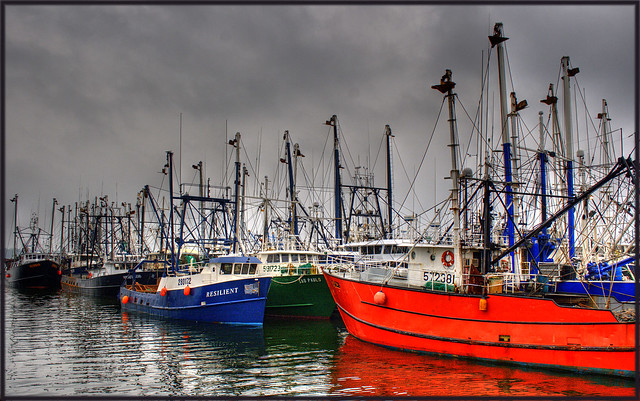 While members of the largest European Parliament Committee, the Environment Committee, voted yesterday by an overwhelming majority (58 votes to 1) for a total reform of the deep-sea fishing Regulation and the phase out of the most destructive fishing gear (deep-sea bottom trawling and gillnetting) beyond 200 meters, political coordinators of the Fisheries Committee gave satisfaction to the industrial fishing lobby this morning with voting decisions which jeopardise the very survival of the Regulation.
While members of the largest European Parliament Committee, the Environment Committee, voted yesterday by an overwhelming majority (58 votes to 1) for a total reform of the deep-sea fishing Regulation and the phase out of the most destructive fishing gear (deep-sea bottom trawling and gillnetting) beyond 200 meters, political coordinators of the Fisheries Committee gave satisfaction to the industrial fishing lobby this morning with voting decisions which jeopardise the very survival of the Regulation.The vote of the Environment Committee sends a strong message that citizens of the EU will no longer tolerate the existence of environmentally destructive and economically under-performing fishing methods (for example, the nine vessels responsible for 98% of the French deep-sea catch are chronically unprofitable despite millions of public subsidies received). In stark contrast, the decision of the six political coordinators of the Fisheries Committee to postpone the debate on the Regulation to the fall, places it in a dangerous inaction zone because of the European elections scheduled for the Spring 2014.
What have they decided? A new impact assessment, a new hearing and a new deadline for tabling amendments. The industry hearing will occur on June 17 and the deadline for amendments, originally scheduled for March 27, is now scheduled for July, a few days before the Parliament shuts down for the summer. Given the inherent slowness of EU policy processes, deferring the discussion of this regulation essentially means watering it down or worse, as time will run out before the European elections in May 2014. According to the English MEP Chris Davies, the new impact assessment insistently requested by the French socialist Isabelle Thomas has "no point" since the European Commission has already produced one using all available data.
"Industrial fishing lobbies have pulled off a political coup in getting the support of members of the Parliament for a second hearing. As if they had not been given the opportunity to participate in the one held on February 19th...” said Claire Nouvian of BLOOM, who points out that the choice of speakers for the deep-sea fisheries hearing held on February 19th at the Fisheries Committee was made on the basis of names proposed by the different political groups and the unanimous agreement of the latter on the final agenda. On March 8th, industrial fishing lobbies complained about a partial hearing in a joint letter to the President of the Fisheries Committee, despite the presence of researchers openly favorable to deep-sea fishing accounting for half the panels.
"Industrial fishing lobbies have just proven again that they have no respect for either the democratic process or scientific findings when results do not go their way," added the founder of BLOOM. In fact, after the publication in a scientific journal in October 2012 of a study that Nouvian co-authored and which demonstrated the mismanagement of deep-sea fisheries in Europe, the authors of the study received a letter threatening prosecution if they did not repudiate their results. The authors answered their data were sound and verified by peer reviewing, but received no further reply. "The fishing lobbies have no other choice than to use vicious methods to defend a reality which is objectively unfavourable to them, not only ecologically but also economically and ethically ... It is the combination of these factors that causes a public outcry against which no dirty tricks will succeed" says Claire Nouvian.
To find out more about deep-sea fishing:
http://www.bloomassociation.org/en/deep-sea-fishing
To see the threat letter of the industry: http://www.bloomassociation.org/download/2012_Oct_UAPF_lobbies_lettre_intimidation.pdf T
he response of authors to the fishing lobbies: http://www.bloomassociation.org/download/Answer_to_French_industrial_lobbies.pdf
To access the analysis of the economic underperformance of French fleets (based on their audited accounts), see (bottom of page in English): http://www.bloomassociation.org/fr/intermarche-sous-perfusion
• In international waters, only 285 ships carry out deep-sea fishing, and more than 80% of them are bottom trawlers flying the flags of a dozen different nations, including France.
• Today, deep-sea fishing in France is a residual activity concerning nine ships owned by three companies. The biggest French deep-sea fleet belongs to the supermarket group Les Mousquetaires/Intermarché (a French retail giant).
• Intermarché renewed its deep-sea fishing fleet in 2004, despite scientists warning about the need to reduce fishing efforts on deep-sea species.
• The catch of deep-sea species is 1% of the whole EU catch.
About BLOOM www.bloomassociation.org
BLOOM is a non-profit organization whose mission it is to protect the oceans by raising awareness and explaining environmental problems through scientific mediation, by producing relevant and independent scientific studies, and by participating in public consultations and institutional processes. Our actions target the general public, as well as political and economic decision-makers.
BLOOM is a member of the Deep Sea Conservation Coalition, a coalition of 70+ NGOs striving to protect the deep ocean: http://www.savethehighseas.org/
Source: Bloom
Image courtesy of twoblueday via Flickr (CC BY 2.0)
